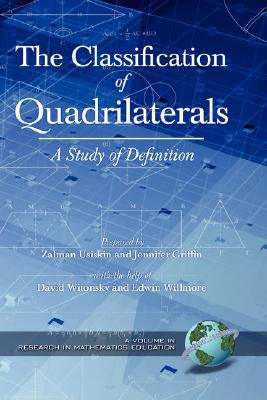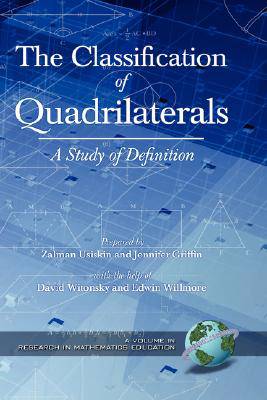
- Afhalen na 1 uur in een winkel met voorraad
- Gratis thuislevering in België vanaf € 30
- Ruim aanbod met 7 miljoen producten
- Afhalen na 1 uur in een winkel met voorraad
- Gratis thuislevering in België vanaf € 30
- Ruim aanbod met 7 miljoen producten
The Classification of Quadrilaterals
A Study in Definition (Hc)
Omschrijving
This monograph reports on an analysis of a small part of the mathematics curriculum, the definitions given to quadrilaterals. This kind of research, which we call micro-curricular analysis, is often undertaken by those who create curriculum, but it is not usually done systematically and it is rarely published.
Many terms in mathematics education can be found to have different definitions in mathematics books. Among these are "natural number," "parallel lines" and "congruent triangles," "trapezoid" and "isosceles trapezoid," the formal definitions of the trigonometric functions and absolute value, and implicit definitions of the arithmetic operations addition, subtraction, multiplication, and division.
Yet many teachers and students do not realize there is a choice of definitions for mathematical terms. And even those who realize there is a choice may not know who decides which definition of any mathematical term is better, and under what criteria. Finally, rarely are the mathematical implications of various choices discussed. As a result, many students misuse and otherwise do not understand the role of definition in mathematics.
We have chosen in this monograph to examine a bit of mathematics for its definitions: the quadrilaterals. We do so because there is some disagreement in the definitions and, consequently, in the ways in which quadrilaterals are classified and relate to each other. The issues underlying these differences have engaged students, teachers, mathematics educators, and mathematicians. There have been several articles and a number of essays on the definitions and classification of quadrilaterals. But primarily we chose this specific area of definition in mathematics because it demonstrates how broad mathematical issues revolving around definitions become reflected in curricular materials. While we were undertaking this research, we found that the area of quadrilaterals supplied grist for broader and richer discussions than we had first anticipated.
The intended audience includes curriculum developers, researchers, teachers, teacher trainers, and anyone interested in language and its use.
Specificaties
Betrokkenen
- Uitgeverij:
Inhoud
- Aantal bladzijden:
- 124
- Taal:
- Engels
- Reeks:
Eigenschappen
- Productcode (EAN):
- 9781593116958
- Verschijningsdatum:
- 4/12/2007
- Uitvoering:
- Hardcover
- Formaat:
- Genaaid
- Afmetingen:
- 156 mm x 234 mm
- Gewicht:
- 353 g

Alleen bij Standaard Boekhandel
Beoordelingen
We publiceren alleen reviews die voldoen aan de voorwaarden voor reviews. Bekijk onze voorwaarden voor reviews.








